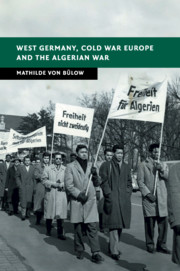Book contents
- Frontmatter
- Contents
- Acknowledgements
- List of abbreviations
- Introduction
- 1 Internationalising colonial warfare: FLN strategy and French responses
- PART I CREATING THE SANCTUARY: NOVEMBER 1954–MAY 1958
- PART II CONTESTING SANCTUARY AND SOVEREIGNTY: JUNE 1958–DECEMBER 1960
- 6 The diplomatic war
- 7 The intelligence war
- 8 The propaganda war
- 9 The war of action
- PART III ASSERTING SOVEREIGNTY: JANUARY 1961–JULY 1962 AND BEYOND
- Conclusion
- Glossary of foreign terms
- Bibliography
- Index
8 - The propaganda war
from PART II - CONTESTING SANCTUARY AND SOVEREIGNTY: JUNE 1958–DECEMBER 1960
Published online by Cambridge University Press: 05 September 2016
- Frontmatter
- Contents
- Acknowledgements
- List of abbreviations
- Introduction
- 1 Internationalising colonial warfare: FLN strategy and French responses
- PART I CREATING THE SANCTUARY: NOVEMBER 1954–MAY 1958
- PART II CONTESTING SANCTUARY AND SOVEREIGNTY: JUNE 1958–DECEMBER 1960
- 6 The diplomatic war
- 7 The intelligence war
- 8 The propaganda war
- 9 The war of action
- PART III ASSERTING SOVEREIGNTY: JANUARY 1961–JULY 1962 AND BEYOND
- Conclusion
- Glossary of foreign terms
- Bibliography
- Index
Summary
In April 1959, an officer of the deuxième bureau attached to the French forces in West Germany presented an overview of FLN activities in that country to his superiors. While ‘the authorities are mostly well-inclined toward us’, the officer began his presentation, referring to the collaborative arrangements between the French and German security services, ‘we have observed just the opposite’ among the public. Whether they were social-democrats, trade unionists, radical leftists and ‘crypto-communists’ (the Communist Party having been constitutionally banned since 1956), all espousing an anti-colonial agenda, or right-wing reactionaries out to harm France, ‘numerous groups offered their support to the FLN’. For now, their ‘initiatives are still scattered’ – even ‘a little anarchic’. Concluding his presentation, the officer observed how ‘the FLN [had] made very good use of the advantages offered by the FRG: a sanctuary, a link to rebel forces [in North Africa and the metropole], and a not insignificant fraction of public opinion sympathetic to its propaganda’. These conclusions raise a number of questions. For one, what prompted such widespread, albeit uncoordinated civic engagement on the FLN's behalf? Moreover, how did this engagement affect the Franco-Algerian propaganda war, and how did the authorities react to it? This chapter argues that the mobilisation of civil-society actors constituted an important strategic aim for the FLN in West Germany. In contrast to Morocco or Tunisia, whose governments actively championed its cause and tolerated its extraterritorial sanctuaries, the FLN operated in an essentially hostile environment in the FRG. Banned by the authorities from engaging overtly in political activities, the movement's representatives came to rely on Germans (as well as their Arab allies) to do their bidding for them. Just as the French security and intelligence services used their German counterparts as auxiliaries to combat the FLN's external sanctuary, so the FLN recruited German proxies to further its political and strategic aims. Winning hearts and minds thus assumed an ever more important dimension in West Germany, for at stake was the endurance of a vital external safe haven and base. With public opinion already poised against the French counterinsurgency, the FLN managed to recruit a broad range of willing helpers. In doing so, the movement helped to shape the humanitarian and developmental policies of a diverse range of German civil-society actors who had begun to take an interest in the decolonising world.
- Type
- Chapter
- Information
- West Germany, Cold War Europe and the Algerian War , pp. 225 - 277Publisher: Cambridge University PressPrint publication year: 2016



